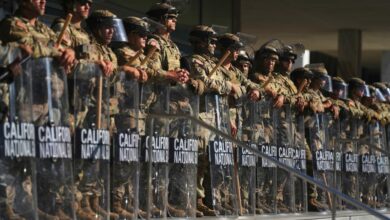China’s Xi convenes ‘Axis of Upheaval’ in Beijing, sidelining Trump

China’s President Xi Jinping convened his Russian and North Korean counterparts together for the first time on Tuesday, a show of solidarity with countries shunned by the West over their role in Europe’s worst war in 80 years.
Vladimir Putin hailed “unprecedentedly high relations” with China and thanked his “dear friend” Xi for the warm welcome during talks at Beijing’s Great Hall of the People, while Kim Jong Un’s armoured special train snaked towards the Chinese capital.
With Iran’s leader also due to attend China’s massive military parade on Wednesday, Xi’s diplomatic clout with a group of authoritarian regimes dubbed the ‘Axis of Upheaval’ by some western analysts, comes at a time US President Donald Trump’s isolationist policies strain Washington’s alliances.
Beyond the pomp, analysts are watching whether the trio may signal closer defence relations following a pact signed by Russia and North Korea in June 2024, and a similar alliance between Beijing and Pyongyang, an outcome that may alter the military calculus in the Asia-Pacific region.
It would also be a blow for Trump, who has talked up his close relations with Putin, Xi and Kim and touted his peacemaking credentials as Russia’s three-and-a-half-year war with Ukraine has raged on.
In a thinly veiled swipe at this rival across the Pacific Ocean on Monday, Xi told a gathering of more than 20 leaders of non-Western countries: “We must continue to take a clear stand against hegemonism and power politics.”
Xi also held talks on Monday with Prime Minister Narendra Modi of India, which alongside China has been targeted by Trump over its purchases of Russian oil seen as helping finance Russia’s war effort.
Trump’s Treasury Secretary Scott Bessent on Monday called the summit “performative” and accused China and India of being “bad actors” by fuelling Russia’s war.
As Putin and Xi met on Tuesday, Russia’s Gazprom and China National Petroleum Corporation signed a deal to increase gas supplies and penned an agreement on a new pipeline that could supply China for 30 years.
The leaders later retired to the Chinese president’s personal residence to continue unspecified negotiations with their delegations.
ALARM BELLS
At a time when Trump has set his sights on a Nobel Peace Prize, any new concentration of military power in the East that includes Russia will ring alarm bells for the West.
“Trilateral military exercises between Russia, China and North Korea seem nearly inevitable,” wrote Youngjun Kim, an analyst at the US-based National Bureau of Asian Research, in March, citing how the conflict in Ukraine has pushed Moscow and Pyongyang closer together.
“Until a few years ago, China and Russia were important partners in imposing international sanctions on North Korea for its nuclear and missile tests… (they) are now potential military partners of the Democratic People’s Republic of Korea during a crisis on the Korean peninsula,” he added, using the diplomatically isolated country’s official name.
Kim is an important stakeholder in the conflict in Ukraine: the North Korean leader has supplied over 15,000 troops to support Putin’s war.
In 2024, he also hosted the Russian leader in Pyongyang – the first summit of its kind in 24 years – in a move widely interpreted as a snub to Xi and an attempt to ease his pariah status by reducing North Korea’s dependence on China.
About 600 North Korean soldiers have died fighting for Russia in the Kursk region, according to South Korea’s intelligence agency, which believes Pyongyang is planning another deployment.
Putin also told the Shanghai Cooperation Organisation summit in Tianjin that a “fair balance in the security sphere” must be restored, shorthand for Russia’s criticism of the eastward expansion of NATO and European Security.
His visit to Beijing and expected meeting with Xi and Kim may offer clues to Putin’s intentions.
For Kim, the parade will mark the largest multilateral diplomatic event he has ever attended.
North Korea’s state newspaper Rodong Sinmun published photographs of Kim and his entourage on the train, including Foreign Minister Choe Son Hui who has been involved in Pyongyang’s diplomacy on weapons developments for more than two decades.
Before crossing to China early on Tuesday, Kim visited a missile laboratory, described by analysts as a planned move.
The visit is geared toward “showing off (North Korea’s) status as a nuclear power” just before “standing alongside Xi and Putin, which is intended to suggest support for North Korea as a nuclear state,” said Hong Min, North Korea analyst at the Korea Institute for National Unification.
Weeks of preparation have gone into the highly-choreographed ‘Victory Day’ parade, marking 80 years since Japan’s defeat at the end of World War Two, with downtown Beijing paralysed by security measures and traffic controls.
Alongside the showcase of cutting edge military hardware in front of an estimated 50,000 spectators, authorities will release more than 80,000 peace doves and colourful balloons.
Credit to Nypost AND Peoples



